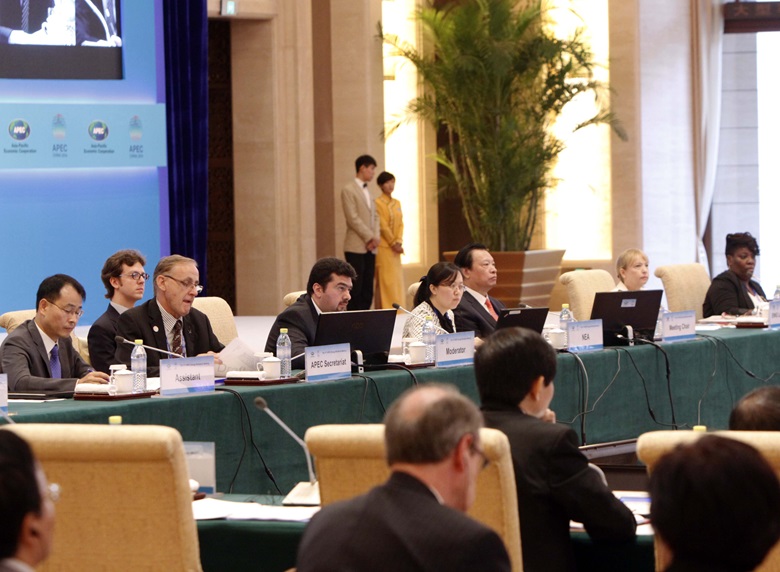APEC Ministers open new chapter in energy cooperation with Beijing Declaration

Energy Ministers from the 21 APEC economies have set in motion a suite of new far-reaching measures to strengthen security and sustainable development within the sector.
Actions to be undertaken by APEC economies, the world’s largest energy producers and consumers, are detailed in the Beijing Declaration that was endorsed by Ministers meeting here at China’s State Guesthouse on Tuesday evening. The goal is to ensure economic growth in the Asia-Pacific while ease intensifying pressure on the environment.
The Beijing Declaration can be viewed at this link.
“The Asia-Pacific region needs to transform the economic growth model and explore the diverse and conservation-minded development path featuring green and low carbon development,” said Zhang Gaoli, China’s Vice Premier, during the APEC Energy Ministerial Meeting which concludes after technical site visits on Wednesday.
“APEC member economies must work with one another in the spirit of inclusiveness and mutual learning to write a new chapter in Asia-Pacific energy cooperation,” he declared.
Collectively, APEC economies account for 55 per cent of global energy production and 60 per cent of total energy consumption. By 2030, fossil fuels will still make up 80 per cent of the region’s energy mix. The opening of vast reserves shale gas and liquefied natural gas, or LNG, is driving this trend.
“Important changes are taking place in the global energy supply and demand structure, explained Wu Xinxiong, Administrator of China’s National Energy Administration, who chaired the meeting. “We need to strike a balance among economic growth, energy security and environmental protection.”
“APEC member economies have different situations in terms of energy structure, supply and demand scale and development strategies but we share the challenges of energy market fluctuations and changes in climate and the environment,” added Wu, who also serves as Vice Chairman of China’s National Development and Reform Commission.
Ministers called on APEC economies to step up efforts to phase out inefficient fossil fuel subsidies that encourage wasteful consumption and launched a new LNG Trade Facilitation Initiative to boost supply through support for public-private partnerships and market-based pricing.
A new multimillion dollar APEC Sustainable Energy Research Center was also inaugurated. Two years in the making, the center will be based in China and promote energy policy and information exchange, research and development, and the application of new technologies.
“We are building the region into an innovation hub for sustainable energy,” said Dr Phyllis Genther-Yoshida, Lead Shepherd of the APEC Energy Working Group. “Our economies are committed to reduce energy intensity in the region by 45 per cent by 2030, from 2005 levels, and we are intent on realizing that promise of greater efficiency.”
Improving quality of life and energy security, the creation of new APEC Low Carbon Model Towns that promote better management of rising energy consumption, increasing the share of renewables, and the facilitation of trade and investment in energy goods and services are further points of emphasis.
“Energy is right in the center of a series of serious challenges for APEC,” concluded Dr Alan Bollard, Executive Director of the APEC Secretariat. “The tariff reductions on environmental goods underway within the region, combined with the development of new technologies and standards that support clean, renewable energy, are putting us on a path to sustainability.”
“Our joint work to power communities and the global supply chains on which we all depend is part and parcel to innovative development, economic reform and growth we aspire to achieve.”
For more:
Downloadable high resolution photos from the 11th APEC Energy Ministerial Meeting are available at this link.
# # #
For additional details, or to arrange possible media interviews, please contact:
David Hendrickson (in China) +86 132 4176 9694/+65 9137 3886 at [email protected]
Michael Chapnick +65 9647 4847 at [email protected]
Information about APEC’s 2014 priorities and initiatives can be found on www.apec.org. You can also follow APEC on Twitter and Sina Weibo and join us on Facebook and LinkedIn.

